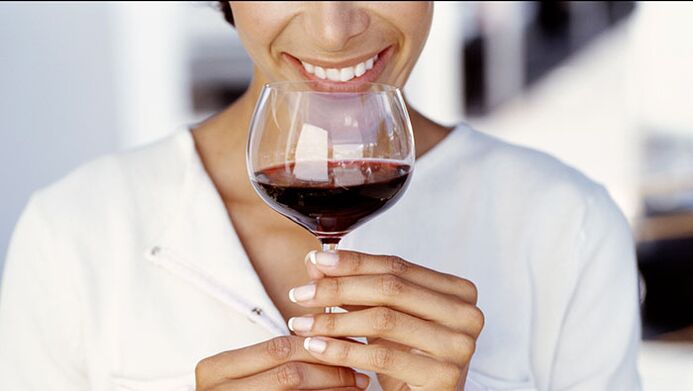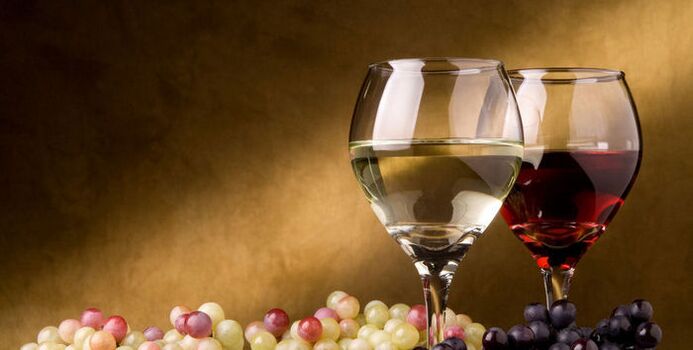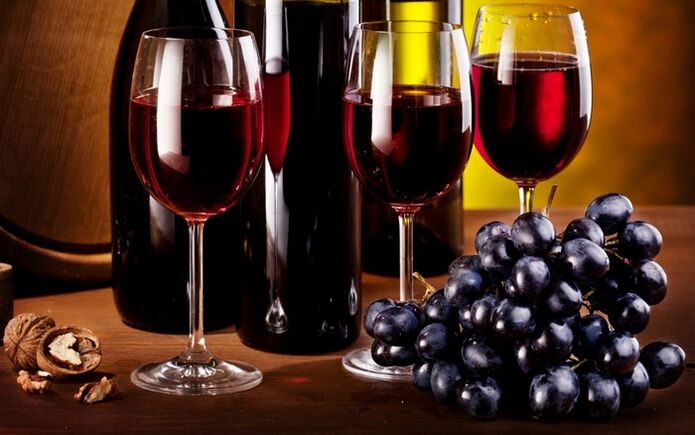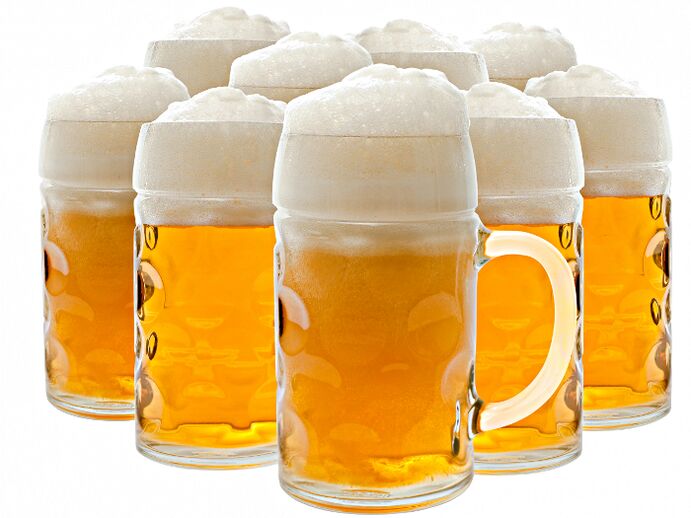A person forced to follow a diet for one reason or another should think about the possibility of incorporating it into the diet before drinking alcohol. Diet spirits can only harm your body and prevent you from losing extra pounds, as many alcoholic beverages with high ethanol content are high in calories. But that doesn't mean you shouldn't drink alcohol while on the diet. Some beverages can be incorporated into your diet in moderation.
Properties of alcoholic beverages

Usually, when we lose weight, we only count the number of calories in the food on the table, without taking into account regular drinks and alcoholic beverages. Some go to the other extreme, believing that alcohol can only reduce your diet, not allowing you to control your food intake, and therefore not drinking at all.
However, not all of us know that during the diet, on the contrary, some alcoholic (low-calorie) drinks are very useful, because they help improve digestion, speed up the process. metabolism, facilitating weight loss. In this case, you need to know exactly what alcohol can be consumed on the diet, as well as whether it is possible to drink strong alcohol during the diet.
To understand what kind of alcohol you can drink during the diet, you need to study the characteristics of its effect on the body. So it should be noted that any alcoholic beverage contains ethanol. This is a fairly high-calorie substance that is well absorbed by our body. There are the following classifications of alcohol:
- non-distilled alcoholic beverages such as wine and beer;
- refined, that is, distilled beverage, namely vodka, whiskey, alcohol.
Alcohol will contribute to excess weight in such cases:
- If you drink alcohol at a holiday party, you will inevitably have to eat, and since alcohol increases your appetite, you may eat more than your diet requires.
- Strong alcoholic beverages are high in calories. That is, if you drink vodka, cognac, whiskey and other strong alcoholic beverages, then you can begin to recover, which during the diet will nullify all your efforts.
- It is not recommended to drink alcoholic beverages containing a lot of sugar, yeast or other nutritional ingredients (ice cream, milk, eggs, various flavors) during the diet as they contribute to rapid weight gain. It is best to drink alcohol with a minimum carbohydrate content.
- Even if you don't take into account how much alcohol we drink, it's worth remembering that ethyl alcohol slows down fat processing. As a result, you may not gain weight, but you will not be able to lose weight with such a diet.
- Moreover, regularly drinking even low-alcohol drinks, you have contributed to disordered metabolism in the body. This leads to the development of alcoholism and weight gain.
Alcoholic beverages allowed on the diet

Now let's find out what you can drink with the diet? If we were to judge all alcoholic beverages in terms of calorie content, the wine with the highest calorie content would be because it contains a lot of sugar and other nutritional additives that give it the most flavor. determined. That is why it is better to refuse to use it in a diet.
When on a diet, it is allowed to drink drinks made on the basis of grape juice. They are not only low in calories, but also very useful, since they contain many useful substances, trace elements and acids. Therefore, you can rest assured that you can drink wine while on a diet. It is certainly possible and even necessary, since wine contains substances that contribute to weight loss, namely:
- Tartaric acid increases the acidity of gastric juice, which significantly improves the digestive process. However, people with high acidity need to be careful, as wine can be harmful to the digestive tract.
- When drinking wine in moderation, the beneficial substances in the drink will improve the metabolism in the body, which is also very beneficial for those who are on a diet.
- Drinking a little wine once a day improves iron absorption, which has beneficial effects on your blood composition and health.
- Red wine contains a special substance that lowers the amount of insulin in the body. This will also have a positive effect on your weight loss, as excess insulin has been shown to contribute to weight gain.
When it comes to dieting, however, it's also important which wine you drink, as different wines have different compositions and strengths.
Alcohol

When deciding what to drink on a diet, wine should come first. It is important to take into account the calorie content of the wine drink. For example, if you decide to drink champagne, then you should know the sugar content of this drink:
- the calorie content of semi-dry champagne is approximately 80 kcal, in 100 g of such alcohol there is up to 9 g of sugar;
- sparkling wine has a slightly lower sugar concentration and a calorie content of up to 70 kcal;
- in semi-sweet champagne there are up to 89 kcal and 1, 2% sugar;
- in a sweet carbonated drink, for every 100 g there are 92 kcal and 1. 5% carbohydrates;
- in forage there are 57 kcal and 0. 3% carbohydrates.
As you can see, bold wine can be an ideal alternative to diet alcoholic beverages, as it has the lowest calorie content. Natural wines would be a good alternative to spirits, but their calorie content should also be taken into account:
- dessert wines are the highest in calories, they contain about 178 kcal per 100 g of the drink;
- in spirits, the calorie content reaches 165 kcal;
- sweet red wines - up to 100 kcal;
- semi-sweet red wine - about 90 kcal;
- semi-dry alcoholic beverages - no more than 80 kcal;
- dry white wine - about 70 kcal.
From this list, the best option for the diet would be the last one, as it's the lowest-calorie option, but you can also buy a glass of dry or semi-dry red wine. It has been proven that people who regularly consume small amounts of red wine keep their skin youthful, heart health, blood vessels and joints longer. And it's all thanks to the polyphenols in red wine.
Advice:If you want a strong or sweet wine, dilute it with some drinking water. This will reduce the calorie content of the product and the sugar concentration.
Beer

If you're a big fan of beer, then on your diet you can drink these low-alcohol soft drinks, as they have fewer calories due to their reduced strength. However, you don't necessarily have to drink beer with salty snacks, as this will make you want to drink more, which will cause you to drink more beer than usual.
It is worth remembering that when drinking beer, there will be more urination, which contributes to the leaching of potassium, magnesium and other useful substances from the body. Beer also contains a lot of natural estrogen, which promotes fat storage. If you choose light beers, pay attention to their calorie content:
- most calories (46 kcal) in beer at 4% strength;
- in drinks with a concentration of no more than 2. 8%, only 35 kcal;
- in a foamed alcoholic drink with a concentration of 1. 8%, there are only 30 kilocalories.
Introduction!If you're going to drink shakes while on a diet, use Diet Coke instead of your regular sugary drink for the concoction.
Alcohol is prohibited in the diet
Vodka, cognac and other strong alcoholic beverages are considered the highest calorie drinks, so it is better to refuse them during the diet. So, for every 100 grams of vodka there are 260 kcal. It is also worth abandoning other alcoholic beverages prepared on the basis of vodka. The number of calories in them is distributed as follows:
- tequila has about 275 kcal;
- anise vodka contains 300 kcal;
- sake - 260 kcal;
- rum, gin, tonic - up to 220 kcal;
- whiskey - 280 kcal;
- sweet liqueur - up to 280 kcal.
If you want to drink as little as possible, then try not to drink on an empty stomach. If you order a liqueur or a cocktail, then give up the sweet dessert altogether. In general, they drink a little liqueur and do not eat anything, because it is very high in calories.

































